Intel's Core i7 870 & i5 750, Lynnfield: Harder, Better, Faster Stronger
by Anand Lal Shimpi on September 8, 2009 12:00 AM EST- Posted in
- CPUs
Intel is on the verge of transitioning to 32nm. We'll see the first parts this year. What do you do with your 45nm fabs when you start moving volume away from them? Make really cheap quad-core Nehalems of course:
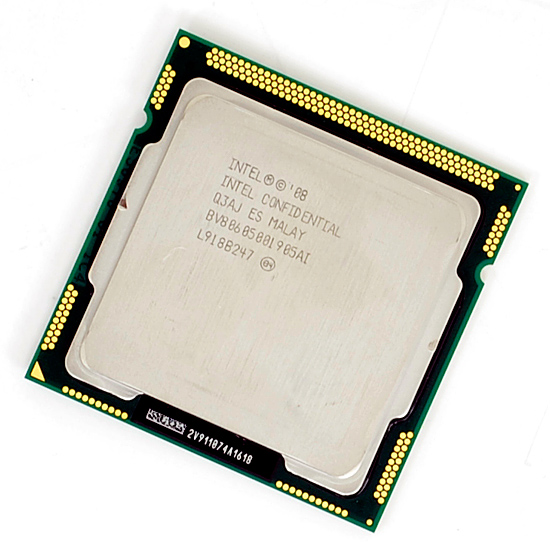
I'm talking $196. I'm talking faster than AMD's entire lineup. I'm talking about arguably the best processor of 2009. I'm talking about Lynnfield, and here's its backside:
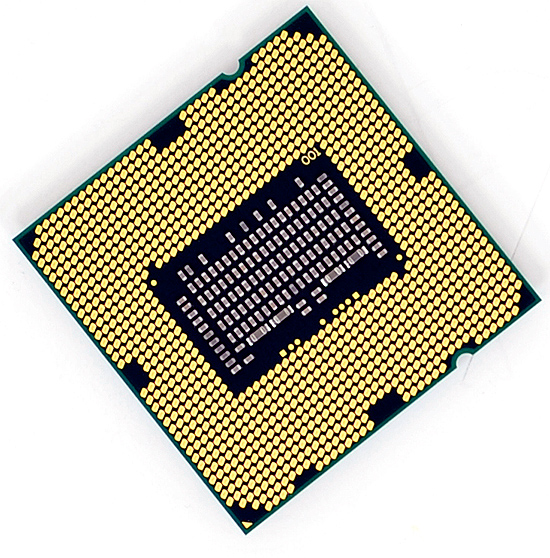
Mmm
I spent much of the past year harping on AMD selling Nehalem-sized Phenom IIs for less than Intel sold Nehalems. With Lynnfield, Intel actually made Nehalem even bigger all while driving prices down. Like I said, what do you do when you're still making boatloads of money in a recession and are about to start emptying your 45nm fabs?
I should clear things up before we progress much further. Lynnfield is the codename for mainstream 45nm quad-core Nehalem, while Bloomfield refers to the first Nehalem launched at the end of 2008:
| Processor | Manufacturing Process | Die Size | Transistor Count | Socket |
| Bloomfield | 45nm | 263 mm2 | 731M | LGA-1366 |
| Lynnfield | 45nm | 296 mm2 | 774M | LGA-1156 |
Despite being cheaper, Lynnfield is larger than Bloomfield. The larger die is due to one major addition: an on-die PCIe controller.
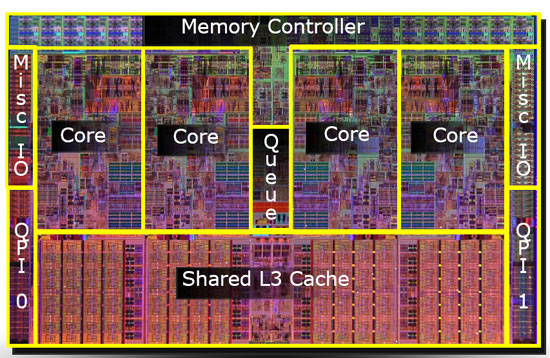
Bloomfield, The First Nehalem, circa 2008
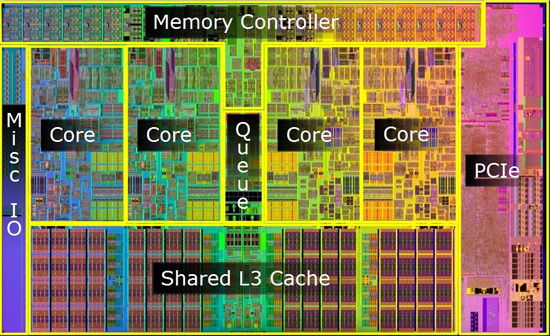
Lynnfield, Nehalem for All, circa 2009
The pink block to the right of the die is the PCIe controller, that's 16 PCIe 2.0 lanes coming right off the chip. Say hello to ultra low latency GPU communication. You'd think that Intel was about to enter the graphics market or something with a design like this.
Sacrifices were made to reduce CPU, socket and board complexity. Gone are the two QPI links that each provided 25.6GB/s of bandwidth to other CPUs or chips on the motherboard. We also lose one of the three 64-bit DDR3 memory channels, Lynnfield only has two like a normal processor (silly overachieving Bloomfield).
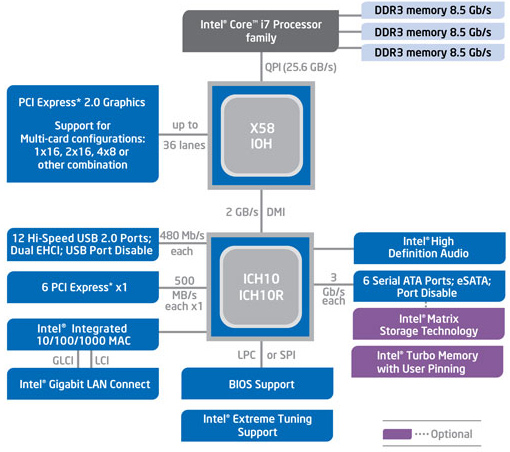
Intel's Bloomfield Platform (X58 + LGA-1366)
The sum is that Lynnfield is exclusively single-socket; there will be no LGA-1156 Skulltrail. While the dual-channel memory controller isn't really a limitation for quad-core parts, six and eight core designs may be better suited for LGA-1366.
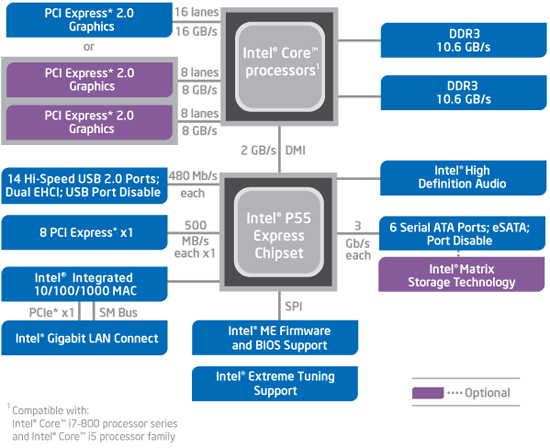
Intel's Lynnfield Platform (P55 + LGA-1156)
The loss of QPI means that Lynnfield doesn't have a super fast connection to the rest of the system, but with an on-die PCIe controller it doesn't matter: the GPU is fed right off the CPU.
The Lineup
We get three Lynnfield CPUs today: the Core i7 870, Core i7 860 and the Core i5 750. Intel's branding folks told us that the naming would make sense one we saw the rest of the "Core" parts introduced; yeah that was pretty much a lie. At least there aren't any overlapping part numbers (e.g. Core i5 860 and Core i7 860).
The i7 in this case denotes four cores + Hyper Threading, the i5 means four cores but no Hyper Threading. The rules get more complicated as you bring notebooks into the fray but let's momentarily bask in marginal simplicity.
| Processor | Clock Speed | Cores / Threads | Maximum Single Core Turbo Frequency | TDP | Price |
| Intel Core i7-975 Extreme | 3.33GHz | 4 / 8 | 3.60GHz | 130W | $999 |
| Intel Core i7 965 Extreme | 3.20GHz | 4 / 8 | 3.46GHz | 130W | $999 |
| Intel Core i7 940 | 2.93GHz | 4 / 8 | 3.20GHz | 130W | $562 |
| Intel Core i7 920 | 2.66GHz | 4 / 8 | 2.93GHz | 130W | $284 |
| Intel Core i7 870 | 2.93GHz | 4 / 8 | 3.60GHz | 95W | $562 |
| Intel Core i7 860 | 2.80GHz | 4 / 8 | 3.46GHz | 95W | $284 |
| Intel Core i5 750 | 2.66GHz | 4 / 4 | 3.20GHz | 95W | $196 |
Keeping Hyper Threading off of the Core i5 is purely done to limit performance. There aren't any yield reasons why HT couldn't be enabled.
Intel was very careful with both pricing and performance of its Lynnfield processors. I'm going to go ahead and say it right now, there's no need for any LGA-1366 processors slower than a Core i7 965:
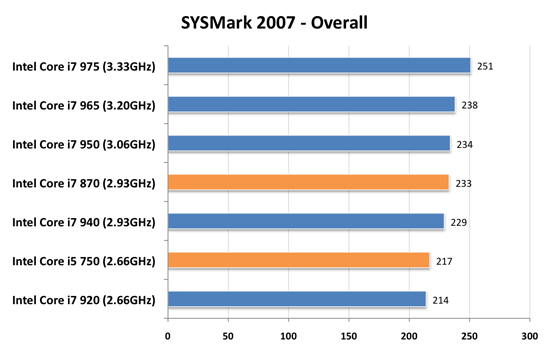
This is only one benchmark, but it's representative of what you're about to see. The Core i7 870 (LGA-1156) is as fast, if not faster, than every single LGA-1366 processor except for the ones that cost $999. Its pricing is competitive as well:
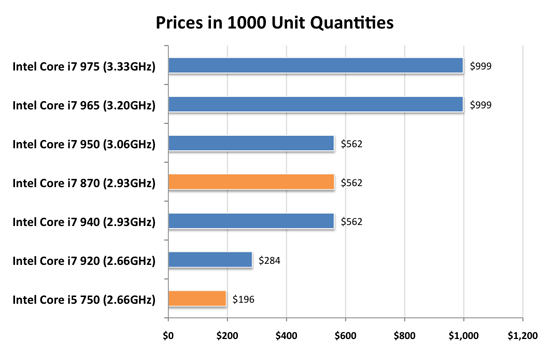
For $196 you're getting a processor that's faster than the Core i7 920. I'm not taking into account motherboard prices either, which are anywhere from $50 - $100 cheaper for LGA-1156 boards. I don't believe LGA-1366 is dead, but there's absolutely no reason to buy anything slower than a 965 if you're going that route.










343 Comments
View All Comments
snakeoil - Tuesday, September 8, 2009 - link
and the cherry on top of the piecore i5 750 and core i3 don't support virtualization.
http://www.virtualization.info/2009/07/intel-core-...">http://www.virtualization.info/2009/07/intel-core-......
that's fantastic, colossal intel.
what's wrong with intel
Anand Lal Shimpi - Tuesday, September 8, 2009 - link
Intel VT-x is supported by the Core i5 750:http://processorfinder.intel.com/details.aspx?sSpe...">http://processorfinder.intel.com/details.aspx?sSpe...
Take care,
Anand
snakeoil - Tuesday, September 8, 2009 - link
sorry incomplete linkhttp://www.virtualization.info/2009/07/intel-core-...">http://www.virtualization.info/2009/07/...core-i3-...
AssBall - Tuesday, September 8, 2009 - link
What are you talking about? These overclock FINE; read the article. 4 Ghz. Anyone that is gonna overclock bloomfield or lynnfield seriously is opting for an aftermarket HSF, so don't bother arguing that. Your comment doesn't make any sense.TA152H - Tuesday, September 8, 2009 - link
You missed the point.When you overclock the processors, you change the characteristics of turbo mode. Consequently, the big advantage of the Lynnfield disappears, and they run at the same clock speed, instead of the Lynnfield at a higher clock speed.
Do you understand now?
eternalfantasy - Tuesday, September 8, 2009 - link
lolemogoinginstyle - Tuesday, September 8, 2009 - link
"There are better sites that have answered these questions. I used to like this site, but this review is another disappointment. "Just how is that Tom's Hardware gig working out for you? I noticed your name was not on any of their launch reviews since you seem to be an expert on the subject. Why is that?
TA152H - Tuesday, September 8, 2009 - link
Thanks for asking.When I have time, I will be writing another article, which they hopefully will use, but to be honest, the time it takes to write an article, at least a well-written one, takes an enormous amount of time and effort.
Getting and verifying data is only part of it. Writing it in an artistic an interesting way is very time consuming, and, at least for me, requires many rewrites of the same pages. Each page took me at least five hours, some many more, plus the upfront time of deciding which pages to write, which probably took at least 30 hours of research.
The editor of Tom's wrote their articles, and it's clear to see the much more thorough review he did. Personally, I like him and occasionally do communicate with him, and I probably would like Anand too, since he seems like a good fellow, but I have no real affiliation with their site. If I write an article they like, they might publish it. That's it.
But, honestly, if you do it for money, you're a fool. It takes WAY too much time for that. You really have to want to do it, and the money is secondary.
goinginstyle - Tuesday, September 8, 2009 - link
So it took you five hours a page to do a copy and paste from Wikipedia on that so called article of yours? I read the Tom's P55 article, not seeing how it was any more thoughtful than the one here or at Tech Report. At least Anand did some searching and reported on items like PCIe clocking/voltage requirements that I noticed was not mentioned at Toms.Your only motive for these posts is to try and look impressive at Toms in hopes that they will publish another boring piece of dung from you. Otherwise, your complaints here are just as justified at Toms or TR, yet you are not posting at either site. That is why it is so obvious as to what you are up to with the flame bait comments.
TA152H - Tuesday, September 8, 2009 - link
I never even looked at Wikipedia, since I don't consider it a valid source of information.Why do you talk about things you don't know about. In fact, some people used Wikipedia to argue some points with me. I made a point never to look at those pages.
But again, what have you done with your, except produce carbon dioxide and speed up global warming? You seem pretty worthless to me.